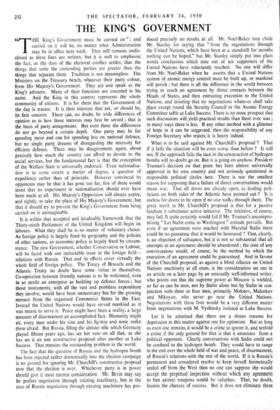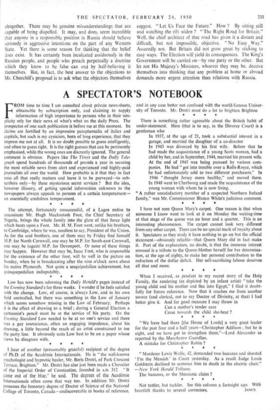THE KING'S GOVERNMENT
T t‘ HE King's Government must be carried on " ; and carried on it will be, no matter what Administration may be in office next week. That still remains undis- closed as these lines are written, but it is well to emphasise the fact, as the dust of the electoral conflict settles, that the things that unite the contending parties are greater than the things that separate them. Tradition is not meaningless. The Ministers on the Treasury bench, whatever their party colour, form His Majesty's Government. They act and speak as the King's advisers. Many of their functions are executed in his name. And the King in this context represents the whole community of citizens. It is for them that the Government of the day is trustee. It is their interests that are, or should be, its first concern. There can, no doubt, be wide differences of opinion as to how those interests may best be served ; that is the basis of party antagonisms. But even there the differences do not go beyond a certain depth. One party may be for spending more and one for spending less on national defence, but no single party dreams of disregarding the necessity for efficient defence. There may be disagreement, again, about precisely how much the country can afford to devote to the social services, but the fundamental fact is that the conception of the Welfare State is universally endorsed. Even nationalisa- tion is to some extent a matter of degree, a question of expediency rather than of principle. However convinced its opponents may be that it has gone too far, few of them would insist that no experiment in nationalisation should ever have been made at all. His Majesty's Opposition will always aspire, and rightly, to take the place of His Majesty's Government, but that it should try to prevent the King's Government from being carried on is unimaginable.
It is within that accepted and invaluable framework that the Thirty-ninth Parliament of the United Kingdom will begin its labours. What they shall be is no matter of voluntary choice. As foreign policy is largely fixed by geography and the policies of other nations, so economic policy is largely fixed by circum- stance. The new Government, whether Conservative or Labour, will be faced with one ineluctable.issue in the foreign field— relations with Russia. That and its effects cover virtually the whole field of foreign policy. The Treaty of Brussels and the Atlantic Treaty no doubt have some virtue in themselves. Co-operation between friendly nations is to be welcomed, even in so sterile an enterprise as building up defence forces ; but those instruments, with all the vast and profitless expenditure they involve, would have been unnecessary but for the growing menace from the organised Communist States in She East. Instead the United Nations would have served mankind as it was meant to serve it. Peace might have been a reality, a large measure of disarmament an accomplished fact. Humanity might sit, every man under his vine and his fig-tree and none make them afraid. But Russia, filling the sinister role which Germany played fifteen years ago, has set her veto on all that, as she has set it on one constructive proposal after another at Lake Success. That remains the outstanding problem in the world.
The fact that the question of Russia and the hydrogen bomb has been injected rather dramatically into the election campaign is no ground for ignoring Mr. Churchill's constructive proposal now that the election is over. Whichever party is in power should give it most earnest consideration. Mr. Bevin may say he prefers negotiation through existing machinery, but in the case of Russia negotiation through existing machinery has pro- duced precisely no results at all. Mr. Noel-Baker may chide Mr. Stanley for saying that "from the negotiations through the United Nations, which have been at a standstill for months nothing can be hoped," but Mr. Stanley simply put into plain words conclusions which nine out of ten supporters of the United Nations have reluctantly reached. No one will differ from Mr. Noel-Baker when he asserts that a United Nations system of atomic energy control must be built up, or mankind will perish ; but there is all the difference in the world between trying to reach an agreement by direct contacts between the Heads of States, and then entrusting execution to the United Nations, and insisting that no negotiations whatever shall take place except round the Security Council or the Atomic Energy Committee table at Lake Success. There is np more prospect that such discussions will yield practical results than there ever was ; in many ways there is less. If any other method with a glimmer of hope in it can be :suggested, then the responsibility of any Foreign Secretary who rejects it is heavy indeed..
What is to be said against Mr. Churchill's proposal ? That if it fails the situation will be even worse than before ? It will not. If the approach fails the race in the construction of hydrogen bombs will no doubt gp on. But it is going on anyhow. President Truman's decision on that point has been almost universally approved in his own country and not seriously questioned in responsible political circles here. There is not the smallest reason for supposing that a failure of direct conrrsations would mean war. That all doors are already open, as leading poli- ticians on both sides of the Atlantic have pointed out ? It is useless for doors to be open if no one walks through them. The great merit in Mr. Churchill's proposal is that for a passive fatalism it substitutes active initiative. The initiative, of course, may fail. It quite certainly would fail if Mr. Truman's uncompro- mising "Let Stalin come to Washington " attitude prevails. But even if an agreement were reached with Marshal Stalin there could be no guarantee that it would be honoured ? That, clearly, is an objection of substance, but it is not so substantial that all attempts at an agreement should be abandoned ; the core of any conversations would, of course, be the method by which the execution of an agreement could be guaranteed. And in favour of the Churchill proposal, as against a blind reliance on United Nations machinery at all costs, is the consideration set out in an article on a later page by an unusually well-informed writer, who points out that the supreme power at Moscow is wielded, so far as can be seen, not by Stalin alone but by Stalin in con- junction with three ct four men, primarily Molotov, Malenkov and Mikoyan, who never go near the United Nations. Negotiations with those four would be a very different matter from negotiations with M. Vyshinsky isolated at Lake Success.
Let it be admitted that there are a dozen reasons for depression in this matter against one for optimism. But so long as even one remains it would be a crime to ignore it, and tenfold a crime if the only ground for that is that it emanates from a political opponent. Clearly conversations with Stalin could not be confined to the hydrogen bomb. They would have to range in the end over the whole field of war and peace, of disarmament, of Russia's relations with the rest of the world. If it is Russia's permanent and considered resolve to keep herself hermetically sealed off from the West then no one can suppose she would accept the perpetual inspection without which any agreement to ban atomic weapons would be valueless. That, no doubt, lessens the chances of success. But it does not eliminate them altogether. There may be genuine misunderstandings that are capable of being dispelled. It may, and does, seem incredible that anyone in a responsible position in Russia should believe seriously in aggressive intentions on the part of any Western State. Yet 1here is some reason for thinking that the belief does exist. It has certainly been inculcated assiduously in the Russian people, and people who preach perpetually a doctrine which they know to be false can end by half-believing it themselves. But, in fact, the best answer to the objections to Mr. Churchill's proposal is to ask what the objectors themselves suggest. "Let Us Face the Future." How ? By sitting still and watching the rift widen ? "The Right Road for Britain." Well, the chief architect of that road has given it a distant and difficult, but not impossible, objective. "No Easy Way." Assuredly not. But Britain did not grow great by sticicing to easy ways. The Election will yield its consequences. The King's Government will be carried on—by one party or the other. But let not His Majesty's Ministers, whoever they may be, deceive themselves into thinking that any problem at home or abroad demands more urgent attention than relations with Russia.



































 Previous page
Previous page